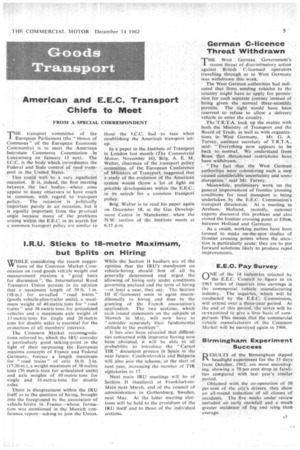German 0-licence Threat Withdrawn
Page 7

If you've noticed an error in this article please click here to report it so we can fix it.
THE West German Government's recent threat of discriminatory action against British C-licensed operators travelling through or to West Germany
was withdrawn this week.
The West German authorities had indicated that firms sending vehicles to the country might have to apply for permission for each separate journey instead of being given the normal three-monthly permits. The right would have been reserved to refuse to allow a delivery vehicle to enter the country. .
The T.R.TA. took up the matter with both the Ministry of Transport and the Board of Trade. as well as with organizations in West Germany. Mr. G. A. Turvey, assistant secretary of T.R.T.A., said: 'Everything now appears to be back to normal. We understand from Bonn that threatened restrictions have been withdrawn. .
"The fact that the West German authorities were considering such a step 'caused considerable uncertainty and some disruption,said Mr. Turvey, Meanwhile, preliminary work -on the general improvement of frontier crossing conditions for road transport is being • undertaken by the E.E.C, CommissiOn's transport directorate. At a meeting 'in Arnhem, Holland, recently, national experts discuss.2d this problem' and also visited the frontier crossing point at Elten, between Holland and Germany.
. As a restilt. working parties have been formed to make on-the-spot studies of frontier crossing points where the situation is particularly acute; they are to put forward solutions likely to produce rapid improvements.
E.E.O. Pay Survey QNE of the 14 industries selected by the E.E.C. Council to figure in its 1963 series of inquiries into earnings is the commercial vehicle manufacturing industry. The inquiries, which will be conducted by the E.E.C. Commission, will extend over a three-year period. At the end of this period, the series will be re-examined to give a firm liasis'of comparison. This means. that the commercial vehicle manufacturers of the Common Market will be surveyed again in 1966.
Birmingham Experiment Suceess
ESULTS of the Birmingham dipped headlight experiment for the 35 days from October, 1962, are most encouraging, showing a 70 per cent drop in fatalities compared with last year's similar period.
Obtained with the co-operation of 50 percent of the city's drivers, they show an all-round reduction of all classes of accidents. The five weeks under review included 'an early snowfall and a much greater incidence of fog and icing than average.




















































































































